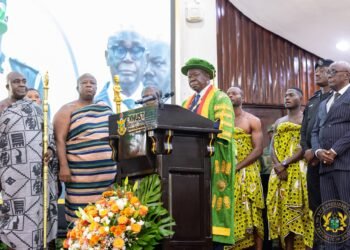The National Public Sector is set to Adopt Reform Strategies to improve performance and enhance service delivery.
The Deputy Director for Planning, Monitoring, and Evaluation at the Driver and Vehicle Licensing Authority (DVLA) Mr. Edmund Cheyou, has provided an insightful update on the organization’s strategic initiatives. Mr. Cheyuo highlighted key areas of focus, including enhancing personnel capacity, streamlining processes, and leveraging technology to improve services.
Mr. Cheyuo began by acknowledging the leadership of DVLA, particularly the Board Chairman, Lawyer Frank Davis Esquire, and the Chief Executive, for their instrumental role in driving progress at the authority. Mr. Cheyuo noted that the DVLA had formulated a comprehensive strategic plan in 2021. This plan was built on three critical pillars: people, process, and technology.
“From the people’s point of view, we realized there were some capacity issues and the testing and licensing of drivers for heavy goods, carrying vehicles. So, we developed a proposal, seeking support from the public sector reform secretariat.”
Mr. Edmund Cheyou the Deputy Director for Planning, Monitoring, and Evaluation
Additionally, there was a recognition that capacity development was also required in areas such as Information Technology (IT), as part of the authority’s effort to transition.
“Part of the strategy was also to go digital, and we had some programs in the digital space where we had to improve the competence of our staff.”
Mr. Edmund Cheyou the Deputy Director for Planning, Monitoring, and Evaluation
Streamlining Processes to Improve Service Delivery
Moreover, Mr. Cheyuo discussed the second thematic area of the strategic plan: process improvement. He emphasized the need to reduce the lengthy procedures that were previously in place at the DVLA, particularly for vehicle registration.
“Another study revealed that some of our processes were too long. If we pick vehicle registration, for instance, there were about 13 processes an applicant had to go through to complete a vehicle registration process, for instance, and that took about 6 hours.”
Mr. Edmund Cheyou the Deputy Director for Planning, Monitoring, and Evaluation
In response to this inefficiency, the DVLA management decided to drastically reduce the time it took to complete vehicle registration. He pointed out that; “…Part of the projects we submitted to the public sector reform was to improve vehicle registration time from 6 hours to about 1 hour.”
Progress in Vehicle Registration Process
Mr. Cheyuo acknowledged that while the DVLA had not fully met their one-hour target for vehicle registration, significant progress had been made.
“The duration now is about reduced from 6 hours. We’ve been able to reduce it significantly to 2 hours, but we haven’t met our target yet.”
Mr. Edmund Cheyou the Deputy Director for Planning, Monitoring, and Evaluation
The final pillar of the DVLA’s strategic plan focuses on technology. Mr. Cheyuo emphasized that technology is integral to achieving the desired improvements in both personnel capacity and process efficiency. He pointed out that; “You mentioned people, technology, process, and technology.”
By integrating digital solutions, the authority seeks to make its operations more efficient and responsive to the needs of its clients. Mr. Edmund Cheyuo update demonstrates the DVLA’s commitment to improving its services by focusing on the core areas of people, process, and technology. While notable progress has been made in reducing vehicle registration times, more efforts are underway to meet the ambitious goals set by the organization. The ongoing investment in personnel capacity and digital transformation reflects the authority’s drive to offer efficient and streamlined services to the public.
Mr. Cheyuo further shed light on the training programs implemented to support DVLA’s strategic plan and innovative projects like the DVLA Mobile Service (D-Mob) and the Tertiary Drive initiative. Mr. Cheyuo emphasized that capacity building was integral to the successful implementation of DVLA’s new strategy.
“As I indicated at the beginning, the people aspects, we realized some capacity gaps, and we had to bring in some consultancy.”
Mr. Edmund Cheyou the Deputy Director for Planning, Monitoring, and Evaluation
This consultancy, sourced from a foreign company through a World Bank project, trained over 60 technical staff members, focusing on driver testing and licensing for higher occupancy and heavy goods vehicles. The training was designed to cover both technical and non-technical staff, ensuring a holistic approach.
“We also train our IT staff because of our reform agenda to digitize all our operations. So we have information technology management training. We also train people in leadership, financial management, project management, monitoring, and evaluation. It was holistic.”
Mr. Edmund Cheyou the Deputy Director for Planning, Monitoring, and Evaluation
DVLA’s New Initiatives: D-Mob and Tertiary Drive
Mr. Cheyuo introduced new initiatives implemented by DVLA to bring its services closer to the public: the DVLA Mobile Service (D-Mob) and the Tertiary Drive initiative. Mr. Cheyuo emphasized that the two projects were some of the new initiatives rolled out by the authority to bring our services to the doorsteps of the general public. The initiative allows the DVLA to provide driver licensing services, such as new licenses, upgrades, renewals, and replacements, directly at the client’s location.
“D-Mob’s is DVLA mobile service. We target corporate institutions. We target organizations, the only criteria we need is a minimum of 20 people, and then our vans equipped with all the testing and licensing will be brought to your doorstep.”
This mobile service offers clients the convenience of completing their driver licensing requirements without having to visit DVLA offices.
“When we come to your environment, we treat it under the premium category, but at the office, you have the opportunity to even select the standard, which is much lower.”
Mr. Edmund Cheyou the Deputy Director for Planning, Monitoring, and Evaluation
Mr. Cheyuo clarified that the fees for DVLA services are regulated by parliament, and the rates depend on the type of service provided. For example, the cost for renewal or replacement of a driver’s license under the D-Mob initiative would not exceed 300 GHS per person. He asserted that; “At the DVLA, we also have all our service categories. You can apply for what we call standard service. We have the premium service and we have prestige service.” The standard service is the lowest-priced option, while the premium and prestige services offer more convenience and speed at higher rates. Mr. Cheyuo remarks highlight the DVLA’s commitment to building the capacity of its staff and introducing new initiatives to enhance service delivery.
The authority’s training programs are comprehensive, covering both technical and non-technical staff, while new services like D-Mob and Tertiary Drive offer greater accessibility to the public. With continued focus on innovation and reform, the DVLA is making significant strides in improving the quality and efficiency of its services.
READ ALSO; Mohbad’s Wife Pays Emotional Tribute on 1st Anniversary of His Passing























